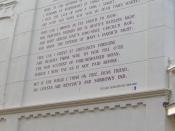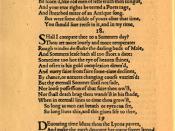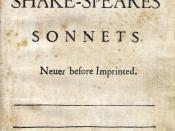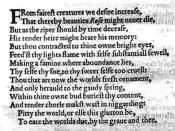Shakespeare uses images of natures bad points in contrast to mankind's good points to emphasize how "ÃÂbeautiful' people can be. By evoking images of storms and baking hot sunshine as he does in Sonnets 65 & 18, he shows just how cruel nature can be. These are the harsh realities of life but we choose to forget them when we think of a beautiful summer's day. He, however, chooses to compare these destructive effects of nature to his friend's own nature. By doing this he makes his friend out to be "ÃÂmore lovely and more temperate' than a summer's day.
In Sonnet 18 [Shall I compare thee to a summer's day"æ] Shakespeare uses the image of a beautiful summer's day to set the mood. He then goes on to state all of the ways in which such a summer's day can be destructive "" "ÃÂRough winds do shake the darling buds of May' "" "ÃÂEvery fair from fair sometime declines'.
He lowers summer's value by stating that it doesn't last forever "" "ÃÂsummer's lease has all too short a date', but raises his friend above summer by saying that his beauty will never fade. He does this through the belief that this poem about his friend will live "ÃÂas long as men can breathe or eyes can see' and that will "ÃÂgive life to thee [his friend]'.
He uses the image of a storm battering beauty in Sonnet 65 [Since brass, nor stone"æ]. He poses the question that if Time can destroy even the toughest things on earth (brass, stone, steel), how can beauty and life ever stand a chance? He likens his friend to being "ÃÂno stronger than a flower' in the "ÃÂwrackful siege of battering days'. He is also racking his brain in an attempt to find a way to preserve "ÃÂbeauty' (beauty is his friend), he asks what power on earth is strong enough to "ÃÂhold [Time's] swift foot back' and finally comes to the conclusion that "ÃÂin black ink' his friends beauty "ÃÂmay still shine bright'.
Shakespeare also writes about arguably the harshest reality of life: - Time. He describes Time as the great giver and even greater taker. Time gives life and beauty but also destroys what it has created. In Sonnet 12 [When I do count the clock that tells the time"æ] he paints a very bleak image of Time as the giver and taker with lines such as "ÃÂSince sweets and beauty do themselves forsake, And die as fast as they see others grow'. He again goes on to try and think of ways to overcome Time but only comes to the conclusion that "ÃÂnothing "ÃÂgainst Time's scythe can make defense' so our only hope is to "ÃÂbreed to brave him when he takes [us] hence'.
In each of Shakespeare's poems there is a definite confidence behind what is being said. He expresses each of his points and thoughts with graphically strong imagery and a belief in his own words. He uses statements that he knows cannot be disproved to back up these words, "ÃÂIf this be error and upon me proved, I never writ nor no man ever loved' [Sonnet 116 "" Let me not to the marriage of true minds"æ]. He may be writing line after line of pessimism but it usually is just a prelude to the closing couplet, in which he raises the mood and tone of the poem. He does this in Sonnet 29 [When in disgrace with Fortune"æ] to good effect. Throughout the three quatrains he used pessimistic lines such as "ÃÂI all alone beweep my outcast state' and "ÃÂlook upon myself and curse my fate' to contrast his feelings to those he has for his friend in the final couplet: "ÃÂFor thy sweet love remember'd such wealth brings, That then I scorn to change my state with kings'.
Effects such as this work well for Shakespeare right through all of the sonnets. The contrasts and comparisons between the harsh realities of life and the fairness and beauty of his loved one are what give the atmosphere to the poem. And the fact that he delivers these effects with such confidence and assurance only help to strengthen the impact of his poems.







